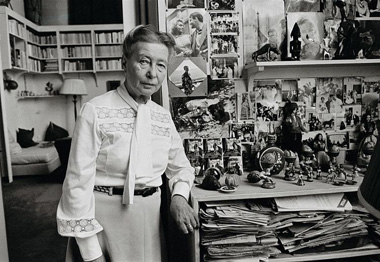Deborah Levy has a unique style of writing which references a disparate range of influences and layers in a lot of symbolism in order to tease out some of the most essential questions about life. I admired the way her novel “Hot Milk” looks at what happens when familial roles are reversed or become more fluid. So it's absolutely fascinating reading “The Cost of Living” which is part of what's been branded Levy's “living autobiography” and follows the time period in which she wrote “Hot Milk”. She describes the state of flux her life was in during this period with the death of her mother and a separation from her longtime husband, but also the professional success she was experiencing with her novel “Swimming Home” being shortlisted for the Booker Prize and its being optioned for a film. But rather than focusing on the mechanics and reasons behind all these changes she traces an everyday account of her life moving forward: renting a small writing studio at the back of someone's garden and considering her position in life because she surmises “We either die of the past or we become an artist.” It's an emotionally arresting account that makes many pithy observations about gender, identity and the writing life.
One of the themes Levy frequently meditates on is the gender roles for women as wives, mothers and writers. The book begins and ends with reference to the breakup of her marriage without going into the specifics of why they separated so her meditation on this subject becomes especially poignant for what Levy leaves unsaid about why her marriage ended. For instance she notes when talking to men at parties or on a train that they don't refer to their wives by name, but simply call them “my wife”. Similarly Levy refers to some of the most important men in her life not by name but by their actions such as “the man who cried at the funeral”. This is a humorous way of highlighting the glaring way men define women by their roles in life rather than acknowledging the complexity of their being.
Levy meditates on the way wives can become trapped in their status and actually transform their identities to fit in with expectations. She reflects how “The moody politics of the modern home had become complicated and confusing… Orwell, in his 1936 essay ‘Shooting an Elephant’, noted that the imperialist ‘wears a mask, and his face grows to fit it’. The wife also wears a mask and her face grows to fit it, in all its variations.” The situation becomes further complicated with the introduction of children and the different levels of freedom allowed to the father over the mother: “When our father does the things he needs to do in the world, we understand it is his due. If our mother does the things she needs to do in the world, we feel she has abandoned us. It is a miracle she survives our mixed messages, written in society’s most poisoned ink. It is enough to drive her mad.” Levy herself resolves to work at the writing life amidst mounting financial pressures, obligations and the responsibility of motherhood. She also poignantly describes her role as a creative writing teacher to hone her students' prose and the way she helps young female writers to embrace the legitimacy of their voices.
Levy writes of Simone de Beauvoir "She was my muse but I was certainly not hers."
While Levy takes her subjects very seriously there is also a wonderful levity to her accounts which include the absurdity of the world and the comic roles we often inadvertently play. For instance she rides her electronic bike to an important meeting and encounters trouble on it, but only realises after the meeting how she had leaves and mud in her hair throughout the day. Or in the desperate last days of her mother's life she manically sought out ice lollies of a certain flavour because they were the only things her dying mother could bear to consume. These add a welcome level of humanity to what could otherwise be ponderous reflections that are too intense.
Readers can sometimes tire of the insular nature of writers who write about the process of writing. But Levy's writing is so expansive in its account of states of being that it always feels refreshing and relatable with a pressing desire to connect. Moreover it comes across as simply honest. Levy notes how “To speak our life as we feel it is a freedom we mostly choose not to take” but thankfully she exerts her freedom to candidly and poignantly speak about what she feels most intensely.









